The sedition act of 1918 Study guides, Class notes & Summaries
Looking for the best study guides, study notes and summaries about The sedition act of 1918? On this page you'll find 48 study documents about The sedition act of 1918.
Page 3 out of 48 results
Sort by
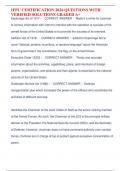
-
IFPC CERTIFICATION 2024 QUESTIONS WITH VERIFIED SOLUTIONS GRADED A+
- Exam (elaborations) • 10 pages • 2024
-
- $13.49
- + learn more
IFPC CERTIFICATION 2024 QUESTIONS WITH VERIFIED SOLUTIONS GRADED A+ Espionage Act of 1917 - CORRECT ANSWER Made it a crime for a person to convey information with intent to interfere with the operation or success of the armed forces of the United States or to promote the success of its enemies. Sedition Act of 1918 - CORRECT ANSWER added to Espionage Act to cover "disloyal, profane, scurrilous, or abusive language" about the American form of government, the Constitution, the flag, ...
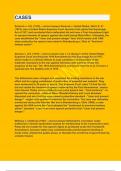
-
CASES|UPDATED&VERIFIED|GUARANTEED SUCCESS
- Exam (elaborations) • 12 pages • 2023
-
- $13.49
- + learn more
Schenck v. U.S. (1919) Schenck v. United States, 249 U.S. 47 (1919), was a United States Supreme Court decision that upheld the Espionage Act of 1917 and concluded that a defendant did not have a First Amendment right to express freedom of speech against the draft during World War I. Ultimately, the case established the "clear and present danger" test, which lasted until 1969 when protection for speech was raised in Brandenburg v. Ohio to "Imminent lawless action". Abrams v. U.S. (19...
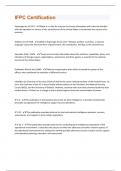
-
IFPC Certification |57 Questions and Answers with complete solution
- Exam (elaborations) • 6 pages • 2023
- Available in package deal
-
- $6.49
- + learn more
Espionage Act of 1917 - Made it a crime for a person to convey information with intent to interfere with the operation or success of the armed forces of the United States or to promote the success of its enemies. Sedition Act of 1918 - added to Espionage Act to cover "disloyal, profane, scurrilous, or abusive language" about the American form of government, the Constitution, the flag, or the armed forces. Executive Order 12333 - Timely and accurate information about the activities, capabi...
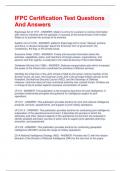
-
IFPC Certification Test Questions And Answers
- Exam (elaborations) • 5 pages • 2023
-
- $10.39
- + learn more
IFPC Certification Test Questions And Answers Espionage Act of 1917 - ANSWER- Made it a crime for a person to convey information with intent to interfere with the operation or success of the armed forces of the United States or to promote the success of its enemies. Sedition Act of 1918 - ANSWER- added to Espionage Act to cover "disloyal, profane, scurrilous, or abusive language" about the American form of government, the Constitution, the flag, or the armed forces. Executive Order 12...
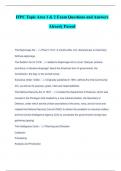
-
IFPC Topic Area 1 & 2 Exam Questions and Answers Already Passed
- Exam (elaborations) • 4 pages • 2023
- Available in package deal
-
- $10.49
- + learn more
IFPC Topic Area 1 & 2 Exam Questions and Answers Already Passed The Espionage Act - Past in 1917, 2 months after U.S. declared war on Germany. Defines espionage. The Sedition Act of 1918 - added to Espionage Act to cover "disloyal, profane, scurrilous, or abusive language" about the American form of government, the Constitution, the flag, or the armed forces. Executive Order 12333 - Originally published in 1981, defines the Intel Community (IC), as well as it's purpose, goals, roles a...
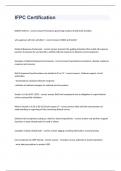
-
IFPC Certification questions with 100% correct answers graded A+ 2023/2024
- Exam (elaborations) • 4 pages • 2023
-
Available in package deal
-
- $12.99
- + learn more
IFPC CertificationEspionage Act of 1917 - correct answer Made it a crime for a person to convey information with intent to interfere with the operation or success of the armed forces of the United States or to promote the success of its enemies. Sedition Act of 1918 - correct answer added to Espionage Act to cover "disloyal, profane, scurrilous, or abusive language" about the American form of government, the Constitution, the flag, or the armed forces. Executive Order 12333 - correct ans...
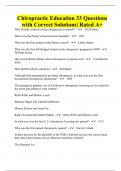
-
Chiropractic Education 33 Questions with Correct Solutions| Rated A+
- Exam (elaborations) • 4 pages • 2023
-
Available in package deal
-
- $9.99
- + learn more
Who initially wanted to keep chiropractic to himself? - D.D Palmer When was the Palmer school and cure founded? - 1897 Who was the first student at the Palmer school? - LeRoy Baker Who was the first full-fledged student in the chiropractic program in 1898? - William Seeley How much did the Palmer school chiropractic program cost? - 3 months for $500 Who did DD sell his school to? - BJ Palmer Although joint manipulation pre-dates chiropractic, in what year was ...
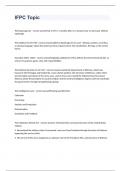
-
IFPC Topic exam 2023 with 100% correct answers
- Exam (elaborations) • 3 pages • 2023
-
- $15.49
- + learn more
The Espionage Act Past in 1917, 2 months after U.S. declared war on Germany. Defines espionage. The Sedition Act of 1918 added to Espionage Act to cover "disloyal, profane, scurrilous, or abusive language" about the American form of government, the Constitution, the flag, or the armed forces. Executive Order 12333 Originally published in 1981, defines the Intel Community (IC), as well as it's purpose, goals, roles and responsibilities. The National Security Act of 1947...
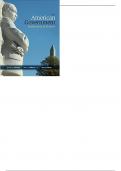
-
Test Bank For American Government Institutions & Policies 14th Edition by James Q. Wilson
- Exam (elaborations) • 292 pages • 2023
-
Available in package deal
-
- $33.82
- + learn more
CHAPTER 3 Federalism MULTIPLE CHOICE 1. When the Framers drafted the Constitution, the Antifederalist opposed it primarily on the grounds that the new government a. empowered state governments. b. created a bicameral Congress. c. gave states the power to coin money. d. created a navy. e. gave too much power to the national government. ANS: E REF: 51 NOT: F OBJ: LO1 2. In this decision, the Supreme Court, by a 5–4 majority, ruled that the individual mandate component of Obamacare was...
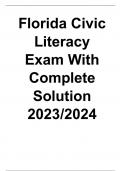
-
Florida Civic Literacy Exam With Complete Solution 2023/2024
- Exam (elaborations) • 7 pages • 2023
-
Available in package deal
-
- $12.49
- + learn more
Florida Civic Literacy Exam Brown v. Board of Education - Answer 1954 - The Supreme Court overruled Plessy v. Ferguson, declared that racially segregated facilities are inherently unequal and ordered all public schools desegregated. McCulloch v. Maryland - Answer 1819 - The Supreme Court ruled that congress had the authority to establish a federal bank that could not be taxed by states. Established that congress could have powers not explicitly described in the constitution. Gibbon...

Did you know that on average a seller on Stuvia earns $82 per month selling study resources? Hmm, hint, hint. Discover all about earning on Stuvia


